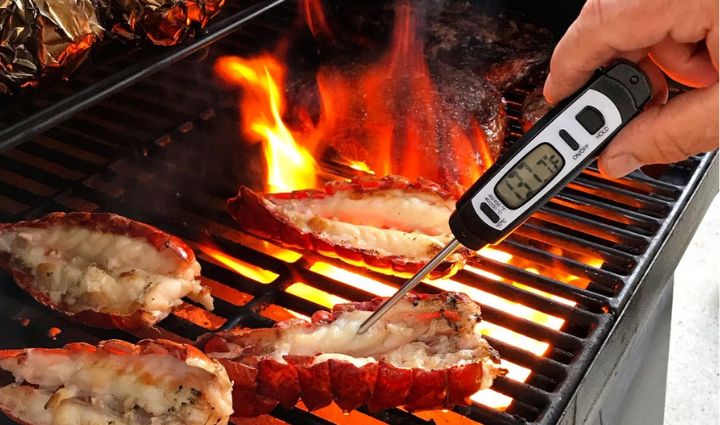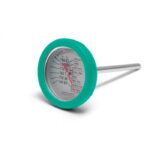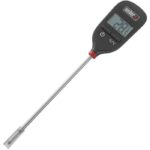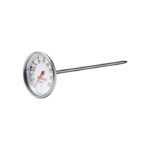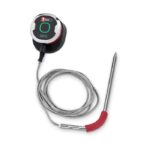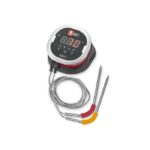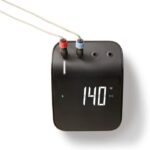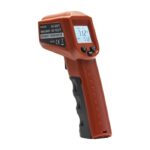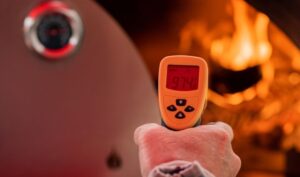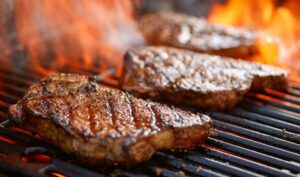Temperature is one of the most important aspects of grilling. The ambient temperature of your grill, the temperature of your cooking zones, and the temperature of the food are all key to ensuring you can serve up the best possible version of the dish you are cooking.
Enter an essential grilling tool: BBQ thermometers.
BBQ thermometers help you confirm that you are cooking at the right temperature and getting your food up to its safe zone without overcooking. The trouble is there are a lot of different types of grill thermometers out there, so how do you know which one is right for you?
In this post, we will explore the basic differences between different BBQ thermometers, as well as four popular types of BBQ meat thermometers, including:
- Probe and instant-read thermometers
- Smart, wireless, and remote grill thermometers
- Infrared and grill surface thermometers
- Ambient thermometers and temperature gauges
Let’s get started by taking a closer look at two categories of BBQ thermometers: gas vs. charcoal grill thermometers and analog vs. digital thermometers.
BBQ Thermometer Basics
Gas grill vs. charcoal grill thermometers
Is there a difference between thermometers for gas grills and charcoal grills? Unless you are trying to match a temperature gauge built specifically into your charcoal or gas grill, there is no real difference and you do not need a specialized thermometer for a gas or charcoal grill. Most grill thermometers will work in propane, natural, or charcoal grills without requiring any specialized components.
Analog vs. digital thermometers
While there’s no difference between gas and charcoal grill thermometers, there is a big difference between analog and digital thermometers. Analog thermometers have an unpowered gauge as a readout face, while digital thermometers will display the temperature precisely in numbers. Think analog clock face vs digital clock.
Analog thermometers are reliable, but because they don’t have a digital readout, they can be slightly inaccurate solely based on the less precise face. With an analog thermometer, you may find yourself guessing at the exact temperature, but this isn’t usually a big deal with most food items you may be grilling. As long as it is roughly the temperature it needs to get to, erring on the higher side for meat, it’s likely fine.
GRILL SPOT TIP: You should always keep an analog thermometer in your drawer in case of emergency. You never know when your batteries are going to die unexpectedly or the electronic components of your digital thermometers may accidentally get dunked in a measuring cup of liquid or a sink full of dishwater, rendering it unusable.
Digital thermometers are more accurate and sometimes have additional helpful features, such as alarms when it gets up to temperature, more than one probe, or even wireless/remote/smart features that will send updates to your phone when your food is nearing temperature (more on these below). Multiple probes can be especially useful—you can keep an eye on the grill surface temp, internal temp, and ambient temp of the grill all at once.
Shop for grill thermometers:
4 Types of BBQ Thermometer
There are four main types of thermometers to use when you BBQ. Which one(s) you should have will depend on what you’re cooking and your personal preferences.
1. Probe/instant-read meat thermometers
Probe or instant-read meat thermometers can be analog or digital, and are inserted directly into the center of the food you are cooking for a quick read of the internal temperature. This is essential for food safety when cooking meat, making this kind of thermometer a must-have item in any kitchen.
- Temperature measured: Internal temperature of the food
- Readout: Digital or analog
- Accuracy: Varies from model to model
- Approximate cost: $-$$ depending on model
- When to use it: To check the internal temperature of food, especially food that needs to get up to a certain temperature for health & safety reasons
Shop for probe thermometers:
2. Smart, wireless & remote grill thermometers
Smart BBQ thermometers send key temperature information directly to your smartphone, which can be especially useful if you would prefer not to stand over the grill monitoring the temp and would instead prefer to keep an eye from a distance while you relax on the couch.
Not all remote or wireless grill thermometers are Smart, but whether or not you actually need a Smart thermometer depends on how you grill and what you are grilling. If you smoke or cook low and slow frequently—or if you just love gadgets and precision grilling—a Smart, wireless, or remote grill thermometer is definitely for you.
- Temperature measured: Most commonly the internal temperature of the food, but can also measure surface and ambient temperature depending on the probes included or added.
- Readout: Digital
- Accuracy: Very accurate
- Approximate cost: $$-$$$
- When to use it: When you’re smoking and need to monitor grill temperature closely, or when you’re cooking very finicky, temperature-dependent food items. When you host BBQ parties often.
Shop for smart thermometers:
3. Infrared thermometers and grill surface thermometers
Infrared thermometers are most commonly used to check the temperature of cooking surfaces: grill grates, griddles, pans, or water. This is especially useful when you are trying to get the perfect sear on a food item.
- Temperature measured: Grill or food surface
- Readout: Digital
- Accuracy: Very accurate
- Approximate cost: $-$$
- When to use it: When measuring the temperature of the surface of the grill grates, griddle, water, pan, or food surface (but always double check internal temperature with a probe for food safety reasons), or when searing food.
Shop for infrared thermometers:
4. Ambient thermometers and temperature gauges
Ambient thermometers and temperature gauges are often built directly into the grill lid. They measure the internal temperature of the grill cavity and can give you a general reading of how hot your grill is, but they are generally considered to be the least accurate temperature gauge because they don’t measure the temperature of the grill surface—just the temperature of the air within the grill.
- Temperature measured: Ambient grill temperature
- Readout: Analog
- Accuracy: Varies depending on model
- Approximate cost: $-$$$
- When to use it: When warming your grill, or when following a recipe—typically the temperature given refers to the ambient temperature of the grill
Conclusion
Not sure which type of BBQ thermometer you need?
- Probe and instant-read meat thermometers let you know immediately what the interior temperature of your food item is. These are essential for cooking meat, especially larger cuts or whole birds.
- Smart, wireless, and remote grill thermometers can be used to monitor your meal from a distance, making them ideal if you host often, can’t spend an unnecessary second away from the game, or are very invested in precise temperature control.
- Infrared thermometers and grill surface thermometers are designed for measuring the cooking surface or surface of the food you are cooking, and are especially useful when you are searing something.
- Ambient thermometers and temperature gauges let you know what temperature the inside of the grill is.

